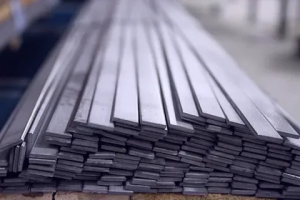Flat Steel Market Gains Momentum with 6.00% CAGR, Poised to Cross USD 817.20 Billion by 2032
The Flat Steel Market involves flat-rolled steel products used across construction, automotive, and manufacturing sectors.
The Global Flat Steel Market was valued at USD 483.70 Billion in 2023 and is projected to reach USD 817.20 Billion by 2032, growing at a CAGR of 6.00% from 2024 to 2032.
Drivers:
Rising Demand from Automotive and Construction Sectors: Flat steel is a core material in car bodies, appliances, and buildings. Rapid urbanization and infrastructure growth—especially in Asia-Pacific and the Middle East—are boosting consumption.
Technological Advancements in Manufacturing: Innovations such as continuous casting and hot-rolled strip processing are enhancing production efficiency and product quality, supporting industry growth.
Government Initiatives and Infrastructure Investment: Public projects in transportation, energy, and housing are major contributors to flat steel consumption, particularly in developing economies.
Growth in Renewable Energy Sector: The rise in solar and wind energy installations is driving demand for flat steel components like structural frames and mounting systems.
Request a Sample Copy of this Report at
https://www.marketresearchfuture.com/sample_request/1885
Restraints:
Volatility in Raw Material Prices: Fluctuating prices of iron ore and coking coal significantly affect production costs, leading to pricing instability and margin pressure.
Environmental Regulations and Emissions Control: Flat steel production is energy-intensive and carbon-heavy. Stringent emissions norms are increasing compliance costs and influencing plant upgrades.
Overcapacity in Major Markets: Countries like China have historically faced overproduction issues, leading to global oversupply, depressed prices, and trade disputes.
Opportunities:
Shift Towards Electric Vehicles (EVs): Lightweight and high-strength flat steel is increasingly used in EV manufacturing, opening up new market segments.
Recycling and Green Steel Initiatives: Growing focus on circular economy practices and the development of low-carbon or hydrogen-based steelmaking technologies present new avenues for sustainable growth.
Expansion in Emerging Markets: Regions in Southeast Asia, Africa, and Latin America offer untapped potential due to rising construction and manufacturing needs.
Secure Your Copy of the Report:
https://www.marketresearchfuture.com/checkout?currency=one_user-USD&report_id=1885
Challenges:
High Capital Intensity: Establishing and upgrading flat steel manufacturing facilities requires substantial capital investment, often limiting new entrants and scalability.
Global Trade Barriers: Tariffs, quotas, and anti-dumping duties are prevalent in the steel sector, posing risks to cross-border supply chains and competitiveness.
Technological Transition Risks: Adapting to Industry 4.0, automation, and decarbonization trends can be complex and expensive, especially for legacy manufacturers.
Table of Contents
SECTION I: EXECUTIVE SUMMARY AND KEY HIGHLIGHTS
EXECUTIVE SUMMARY
• Market Overview
• Key Findings
• Market Segmentation
• Competitive Landscape
• Challenges and Opportunities
• Future Outlook
SECTION II: SCOPING, METHODOLOGY AND MARKET STRUCTURE
SECTION III: QUALITATIVE ANALYSIS
SECTION IV: QUANTITATIVE ANALYSIS
SECTION V: COMPETITIVE ANALYSIS
LIST Of tables
LIST Of figures
Continue…
Browse Related Report
Elemental Fluorine Market
https://www.marketresearchfuture.com/reports/elemental-fluorine-market-7789
Glycoprotein Market
https://www.marketresearchfuture.com/reports/glycoprotein-market-10533
Adjustable Boxes Market Adjustable Boxes Market
https://www.marketresearchfuture.com/reports/adjustable-boxes-market-11443
Static Crane Market
https://www.marketresearchfuture.com/reports/static-crane-market-11498
Smart Retail Packaging Market
https://www.marketresearchfuture.com/reports/smart-retail-packaging-market-11501
construction composites market
https://www.marketresearchfuture.com/reports/construction-composites-market-11586
Flexible Insulation Market
https://www.marketresearchfuture.com/reports/flexible-insulation-market-11688
Construction Repair Composites Market
https://www.marketresearchfuture.com/reports/construction-repair-composites-market-12275
Food Biodegradable Packaging Market
https://www.marketresearchfuture.com/reports/food-biodegradable-packaging-market-12338
Pharma Packaging Films Market
https://www.marketresearchfuture.com/reports/pharma-packaging-films-market-12384
Market Research Future
Market Research Future
+ +1 855-661-4441
email us here
Legal Disclaimer:
EIN Presswire provides this news content "as is" without warranty of any kind. We do not accept any responsibility or liability for the accuracy, content, images, videos, licenses, completeness, legality, or reliability of the information contained in this article. If you have any complaints or copyright issues related to this article, kindly contact the author above.
Singapore, U.S. Strengthen Defense Ties with Launch of New Joint Master’s Degree at NPS
Impeccable Mobile Detail Becomes STEK-Certified, Partners with LugWrench Heroes for Premium Paint Protection
Chicago Attorney, Paul Greenberg, Raises Awareness of Unseen Car Accident Injuries Like Nightmares and PTSD
Więcej ważnych informacji
 Jedynka Newserii
Jedynka Newserii

 Jedynka Newserii
Jedynka Newserii

Polityka

D. Joński: Nie wiemy, co zrobi Rosja za dwa–trzy lata. Według duńskiego wywiadu może zaatakować kraje nadbałtyckie i musimy być na to gotowi
Zdecydowana większość krajów unijnych wskazuje na potrzebę wzmocnienia zdolności obronnych Europy w obliczu coraz bardziej złożonego geopolitycznego tła. Wywiady zachodnich państw wskazują, że Rosja może rozpocząć konfrontację z NATO jeszcze przed 2030 rokiem. Biała księga w sprawie obronności europejskiej „Gotowość 2030” zakłada m.in. ochronę granic lądowych, powietrznych i morskich UE, a sztandarowym projektem ma być Tarcza Wschód. – W budzeniu Europy duże zasługi ma polska prezydencja – ocenia europoseł Dariusz Joński.
Transport
Duże magazyny energii przyspieszą rozwój transportu niskoemisyjnego w Europie. Przyszłością może być wodór służący jako paliwo i nośnik energii

Zmiany w europejskim transporcie przyspieszają. Trendem jest elektromobilność, zwłaszcza w ramach logistyki „ostatniej mili”. Jednocześnie jednak udział samochodów w pełni elektrycznych w polskich firmach spadł z 18 do 12 proc., co wpisuje się w szerszy europejski trend spowolnienia elektromobilności. Główne bariery to ograniczona liczba publicznych stacji ładowania, wysoka cena pojazdów i brak dostępu do odpowiedniej infrastruktury. – Potrzebne są odpowiednio duże magazyny taniej energii. Przyszłością przede wszystkim jest wodór – ocenia Andrzej Gemra z Renault Group.
Infrastruktura
W Polsce w obiektach zabytkowych wciąż brakuje nowoczesnych rozwiązań przeciwpożarowych. Potrzebna jest większa elastyczność w stosowaniu przepisów

Pogodzenie interesów konserwatorów, projektantów, inwestorów, rzeczoznawców i służby ochrony pożarowej stanowi jedno z największych wyzwań w zakresie ochrony przeciwpożarowej obiektów konserwatorskich. Pożary zabytków takich jak m.in. katedra Notre-Dame w Paryżu przyczyniają się do wprowadzania nowatorskich rozwiązań technicznych w zakresie ochrony przeciwpożarowej. W Polsce obowiązuje już konieczność instalacji systemów detekcji. Inwestorzy często jednak rezygnują z realizacji projektów dotyczących obiektów zabytkowych z uwagi na zmieniające się i coraz bardziej restrykcyjne przepisy czy też względy ekonomiczne.
Partner serwisu
Szkolenia

Akademia Newserii
Akademia Newserii to projekt, w ramach którego najlepsi polscy dziennikarze biznesowi, giełdowi oraz lifestylowi, a także szkoleniowcy z wieloletnim doświadczeniem dzielą się swoją wiedzą nt. pracy z mediami.




![Nestlé w Polsce podsumowuje wpływ na krajową gospodarkę. Firma wygenerowała 0,6 proc. polskiego PKB [DEPESZA]](https://www.newseria.pl/files/1097841585/fabryka-nesquik_1,w_85,r_png,_small.png)




.gif)

 |
| |
| |
|